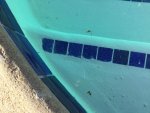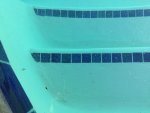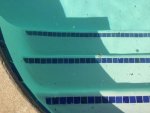First off, you should probably not be communicating directly with the crew, or even their foreman. You should be speaking with the person that provided and signed the contract. I would do so in writing, or follow up any verbal conversations with a synopsis in writing. Email is OK.
I already shared what I think I know about sanding plaster. Plaster has a depth, it varies throughout your pool. On top of that is a layer of creme, which is considerably thinner. Pool chemicals attack this cream layer over the years. Once it loses that battle, your plaster needs to be replaced. I would want to know that my plaster was installed with the proper amount of cream, as smooth as reasonable, and I wouldn't want it sanded down any to obscure or remove a bad application. There is some wiggle room there. A light sanding to remove a rough spot would be one thing. Removing half the cream layer to smooth out a bump or valley would be something else all together. Unfortunately, I can't advise on how you are going to know the difference, other than to communicate this concern to the plaster company, and/or watch how they fix your surface's issues. If it's a guy using fine sandpaper by hand, that's probably OK. If it's a guy with a power sander/grinder with a course pad, pressing hard on it... not so much.
This is not my area of expertise, but rather my logic applied from working with similar materials. That and the incident where my PB grinder right through my plaster's cream and exposed the aggregate underneath (so I've seen this happen with my own eyes). Have you ever tried to refinish a table that has a thin laminate surface glued to particle board underneath. You get a few passes with the ol' orbital sander, but once you sand through the laminate and expose the particle board underneath, your table is ruined.
But that's not a great analogy, because if these guys grind off their mistakes and leave just enough cream to hide the plaster aggregate underneath, you might not know that until 10 years from now when your pool chem's finally wear it down. Which will be long after the warranty has expired... Which, frankly, I would suspect they're counting on if I were you, until they can prove to you otherwise. It's all well and good and friendly to expect the best of a contractor, until proven otherwise. I'm quite a bit more cynical. I expect the worst until proven otherwise... That might be just me...
I can't speak to the black streaks, sorry. Others here will chime in about how to test for what they might be.




